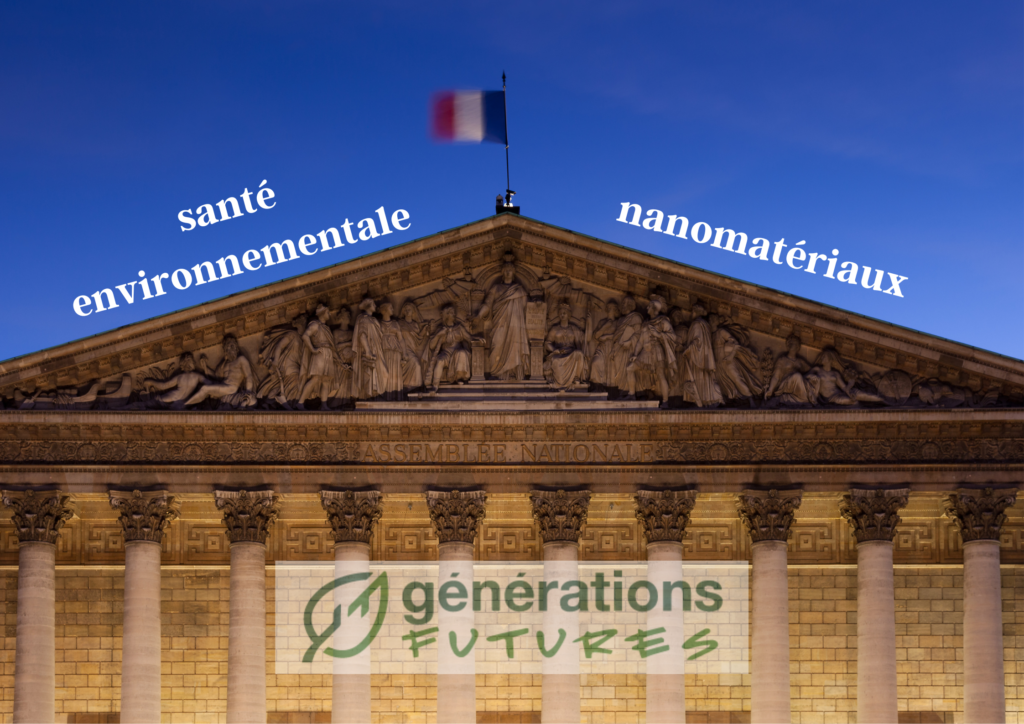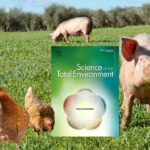
Environmental health and Nanos: Générations Futures’ recommendations to the National Assembly
The French association Générations Futures, which campaigns against chemical pollution, published today its recommendations on dangerous chemicals and pesticides, for the new members of parliament. These recommendations, more specifically targeted at the Sustainable Development and Economic Affairs Commissions, are broken down into 10 key measures and 6 guidelines that are the subject of a more detailed program presenting“clear and immediately actionable measures”.
For Veillenanos, AVICENN has identified two measures specifically concerning nanomaterials, mentioned in the document of Generations Future:
More transparency to reduce the exposure of populations and the environment to nanomaterials
Among the areas of work outlined by Générations Futures, the first focuses on reducing the exposure of populations and the environment to chemical substances, and in particular to nanomaterials.
For this, the association asks “to obtain the publication on the Internet of all the data of the evaluation files of the substances carried out on pesticides, biocides, plastics nanomaterials in a format that can be consulted, including the initial and additional data provided by industry“.
“Pending the substitution or withdrawal from the market of these dangerous substances for everyday consumer products”, the NGO also calls for “the introduction of a label providing information on the presence of these substances”. This recommendation is in line with action 13 of the National Environmental Health Plan (PNSE 4) to which AVICENN contributed1Cf. action 14 of our 20 proposals concerning the reduction of exposure to nanomaterials, AVICENN, June 2019.
Accelerate research on the effects of nanomaterials, cocktail effects and their consequences
Another area of work relates to the improvement of research. This time, it insists on the importance of “accelerating research on the effects of chemical pollutants (EPs, nanomaterials, CMRs, persistent and bioaccumulative substances (PBTs) and very persistent and very bioaccumulative substances (vPvBs)), on “cocktail effects”, on the consequences of multiple low-dose exposures and on the exposome.”
These requests concerning specifically nanomaterials are in line with the recommendations from some associations listed by AVICENN. In 2019, AVICENN had compiled 20 actions and solutions proposed by civil society to improve risk assessment, environmental and health protection and public information on nanos.
Moving from recommendations to action
These recommendations are not fundamentally new, but they need to be reiterated and will need to be reiterated again as long as they remain unheeded. As the association points out, scientists’ warnings about the dangers of certain chemicals for health and the environment go back at least to the 1960s. This is why, for Générations Future, “it is time to act for effective public policies in environmental health (…) by taking measures to combat the harmful effects of chemical pollutants”. Especially since chemical pollutants are high on the European agenda2 See Need for speed on chemical protections in Europe, EEB, 11 July 2022 and that the different ecosystems are facing a pollution proportional to the profits of the chemical industry3Cf. Don’t believe everything you hear – European chemical industry is doing fine, ChemSec, 4 October 2022. After the recommendations, will we see some actions?

Other news on the topic
Upcoming Nano Agenda
- Introductory seminar on the principles of Life Cycle Assessment (LCA) and its specificities when applied to nanomaterials (metal nanoparticles, oxides, etc.), from their production to their end-of-life.
- Organizer: NaMasTE research group (Manufactured Nanomaterials, Toxicology, Ecotoxicology and Risks: Towards Controlled Development)
- Speaker: Gaetana (Tania) Quaranta, Senior Lecturer, University of Strasbourg – IPHC
- Website: https://gdr-namaste.cnrs.fr/

- Webconference for analysis laboratories, plant fertilizer manufacturers and distributors, public authorities…
- Moderated by David Krupka, nanotechnologies development manager at AFNOR Normalisation and Emilie Langlois-Bertrand, nantechnologies standardization project manager.
- In partnership with Armand Masion (CEREGE) and Patrice Charpentier (ANSES).
- This exchange will also be an opportunity to explore the creation of a national platform to identify standardization needs.
- Website: https://www.afnor.org/evenements/qualite/nanotechnologies-agriculture-cadre-pratique-responsable

- International conference on metallic nano-objects for experts working in the interdisciplinary field of metallic nanoparticles, with a particular emphasis on nanoparticle synthesis and characterization, plasmonics, optics and photonics, catalysis, biomedicine, electronics, and nanoparticle recycling
- Organizers / Partners: CNRS, Bordeaux University, Bordeaux INP, ICMCB, CRPP, CBMN, ISM
- Website: https://mno2026.sciencesconf.org
Notes and references
- 1Cf. action 14 of our 20 proposals concerning the reduction of exposure to nanomaterials, AVICENN, June 2019
- 2See Need for speed on chemical protections in Europe, EEB, 11 July 2022
- 3Cf. Don’t believe everything you hear – European chemical industry is doing fine, ChemSec, 4 October 2022



